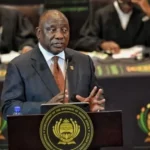Clashes erupted between different factions of Eritrean asylum seekers, resulting in injuries and escalating tensions. Here’s a brief overview of the situation and Prime Minister Benjamin Netanyahu’s response.
Thousands of Eritreans have sought refuge in Israel, escaping the oppressive rule of President Isaias Afwerki in their homeland. Israel hosts a significant number of African refugees, primarily from Sudan and Eritrea, although most are not recognized as legitimate asylum seekers.
The conflict began when the Eritrean embassy in Israel organized an event to celebrate 30 years of independence. Critics viewed this celebration as an endorsement of a dictator’s regime, leading to confrontations between protesters opposing Afwerki’s government and attendees of the event.
The clashes escalated as protesters breached police barriers, causing vandalism and violence. Supporters of Afwerki’s government engaged in physical altercations with the protesters. Israeli police responded with tear gas, stun grenades, and, in some instances, live rounds.
Prime Minister Netanyahu swiftly condemned the violence and convened a ministerial team to address the issue of “illegal infiltrators” who he believes pose a threat to Israel’s future. Netanyahu’s response includes his intention to expel all African migrants, citing the success of a border fence with Egypt a decade ago.
However, the situation is complex, with concerns raised about the treatment of African asylum seekers in Israel. International law prohibits the forced return of individuals to countries where their safety is at risk, presenting significant challenges to Netanyahu’s plan.
Violent clashes among Eritrean asylum seekers in Israel have heightened tensions and raised questions about the treatment of refugees. Prime Minister Netanyahu’s proposed solution faces hurdles due to legal and humanitarian considerations.









